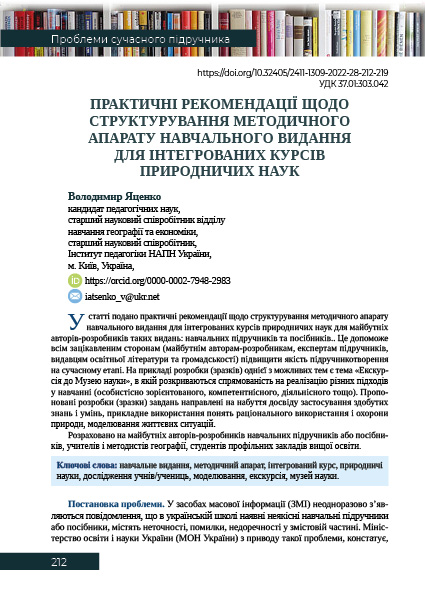Practical recommendations for structuring the methodological apparatus of the educational publication for integrated natural sciences courses

Published 2022-07-20
Keywords
- educational publication,
- methodological apparatus,
- integrated course,
- natural sciences,
- research of pupils / students
- modeling,
- excursion,
- museum of science ...More
How to Cite

This work is licensed under a Creative Commons Attribution-NonCommercial-ShareAlike 4.0 International License.
Abstract
The Ministry of Education and Science of Ukraine pays due attention to the problems of low-quality textbooks and textbooks that contain inaccuracies, errors and inappropriate content. We focus on building the methodological apparatus of the educational publication for students of 5th – 6th grades of general secondary education in natural sciences.
The article provides practical recommendations for structuring the methodological apparatus of the educational publication for integrated courses of natural sciences for future authors-developers of the following publications: textbooks and manuals. This will help all stakeholders (future authors, textbook experts, publishers of educational literature and the public) to improve the quality of textbooks at the present stage. An example of the development (samples) of one of the possible topics is the topic “Excursion to the Museum of Science”, which reveals the focus on the implementation of different approaches to learning. The proposed tasks are aimed at gaining experience in applying the acquired knowledge and skills, the applied meaning of the concepts of rational use and protection of nature, modeling of life situations.
The methodological apparatus of the educational publication contains questions and tasks of practical direction, which are connected, first of all, with the practice of life, taking into account the age characteristics of students, the use of various forms of education. The individual samples of the methodological apparatus developed by the author are of methodological and illustrative nature, with the aim of demonstrating the implementation of the course of textbook creation with the available cognitive material.
Prospects for further research are outlined: first, it is the development of appropriate topics for tasks that contain specially designed situations of choice. Secondly, it is necessary to consider a holistic system of tasks and questions for self-analysis, self-assessment, self-knowledge of students. Third, to describe in the content of textbooks the situations that create the preconditions for cooperation, active participation of students in the learning process, which contribute to the cooperation of students with adults, and so on. Fourth, the analysis of this criterion should also reveal the presence of tasks of varying complexity, which help to organize a differentiated study of integrated courses, effective organization of individual learning activities of students with different abilities and learning opportunities. Fifth, special attention should be paid to methodically correct, clear and correctly formulated questions and tasks according to the category of users.
The article is designed for the interest of future authors-developers of textbooks or manuals, teachers and methodologists of geography, students of specialized institutions of higher education.
Downloads
References
- Головіна, О. (2020). Як планують змінити процедуру вибору підручників. Нова українська школа. https://nus.org.ua/articles/yak-planuyut-zminyty-protseduru-vyboru-pidruchnykiv/
- Засєкіна, Т.М., Білик, Ж.І., Лашевська, Г.А., Яценко, В.С. (2021). Модельна навчальна програма «Природничі науки (вступ)»: Інтегрований курс природничих предметів. 5–6 класи для закладів загальної середньої освіти. Київ: КОНВІ ПРІНТ.
- Круглов, В. (2021). 6 проблем, які потрібно вирішити, щоб покращити якість українських підручників. Українська правда. 2021. 20 вересня. https://life.pravda.com.ua/columns/2021/09/20/245951/
- Малахова, А.О. (2021). Експертиза шкільних підручників: інструктивно-методичні матеріали для експертів щодо здійснення антидискримінаційної експертизи електронних версій проектів підручників, поданих на конкурсний відбір проектів підручників для 5 та 10 класів закладів загальної середньої освіти. Київ: Педагогічна думка.
- Методичні рекомендації (2022) «Про здійснення комплексної експертизи об’єктів грифування (крім електронних) та критеріїв їх оцінювання з метою надання оцінки доцільності надання відповідного грифа Міністерства освіти і науки України». https://drive.google.com/file/d/10tSZkU3ubExSo5CeJ2wMiZNBYoOAHKpb/view
- МОН та УІРО формують креативну команду фахівців для підготовки до експертної роботи щодо оцінювання якості підручників для Нової української школи. Український інститут розвитку освіти. (2020). 05 травня. https://uied.org.ua/mon-ta-uiro-formuyut-kreativnu-komandu-fahivcziv-dlya-pidgotovki-do-ekspertno%D1%97-roboti-shhodo-oczinyuvannya-pidruchnikiv-dlya-novo%D1%97-ukra%D1%97nsko%D1%97-shkoli/
- Пархоменко, Н. (2019). Школа експертів підручників: перспективи становлення. Проблеми сучасного підручника: збірник наукових праць. 22, 201–212.
- Топузов, О. М., Вяткін, Н. Б. (ред). (2016). Експертиза шкільних підручників: інструктивно-методичні матеріали для експертизи електронних версій проектів підручників для учнів 8 класу загальноосвітніх навчальних закладів. Київ: Педагогічна думка.
- Яценко, В. С. (2020). Методичні особливості застосування міні-модулів курсів за вибором у профільному навчанні сільських закладів загальної середньої освіти. Проблеми сучасного підручника: збірник наукових праць. 25,228–239. DOI.: 10.32405/2411-1309-2020-25-228-239
